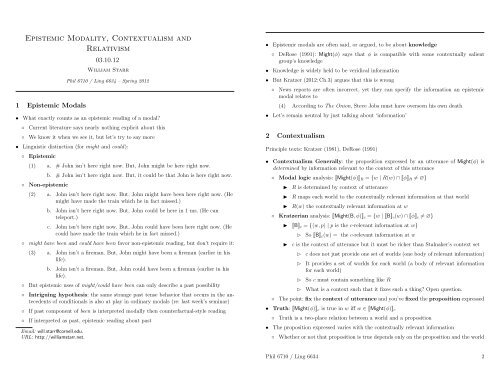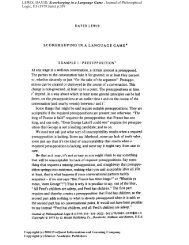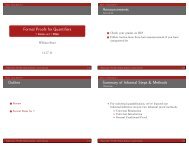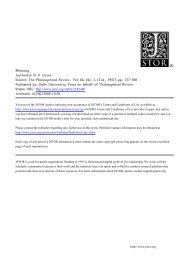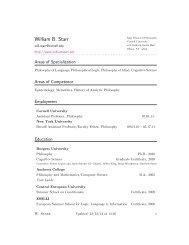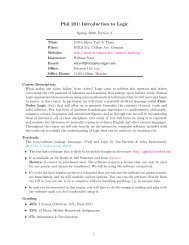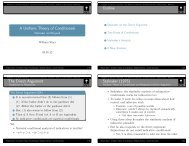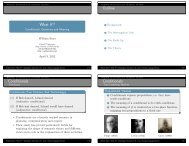Epistemic Modality, Contextualism and Relativism - Will Starr
Epistemic Modality, Contextualism and Relativism - Will Starr
Epistemic Modality, Contextualism and Relativism - Will Starr
Create successful ePaper yourself
Turn your PDF publications into a flip-book with our unique Google optimized e-Paper software.
<strong>Epistemic</strong> <strong>Modality</strong>, <strong>Contextualism</strong> <strong>and</strong><br />
<strong>Relativism</strong><br />
1 <strong>Epistemic</strong> Modals<br />
03.10.12<br />
<strong>Will</strong>iam <strong>Starr</strong><br />
Phil 6710 / Ling 6634 – Spring 2012<br />
• What exactly counts as an epistemic reading of a modal?<br />
◦ Current literature says nearly nothing explicit about this<br />
◦ We know it when we see it, but let’s try to say more<br />
• Linguistic distinction (for might <strong>and</strong> could):<br />
◦ <strong>Epistemic</strong><br />
(1) a. # John isn’t here right now. But, John might be here right now.<br />
◦ Non-epistemic<br />
b. # John isn’t here right now. But, it could be that John is here right now.<br />
(2) a. John isn’t here right now. But, John might have been here right now. (He<br />
might have made the train which he in fact missed.)<br />
b. John isn’t here right now. But, John could be here in 1 ms. (He can<br />
teleport.)<br />
c. John isn’t here right now. But, John could have been here right now. (He<br />
could have made the train which he in fact missed.)<br />
◦ might have been <strong>and</strong> could have been favor non-epistemic reading, but don’t require it:<br />
(3) a. John isn’t a fireman. But, John might have been a fireman (earlier in his<br />
life).<br />
b. John isn’t a fireman. But, John could have been a fireman (earlier in his<br />
life).<br />
◦ But epistemic uses of might/could have been can only describe a past possibility<br />
◦ Intriguing hypothesis: the same strange past tense behavior that occurs in the antecedents<br />
of conditionals is also at play in ordinary modals (re: last week’s seminar)<br />
◦ If past component of been is interpreted modally then counterfactual-style reading<br />
◦ If interpreted as past, epistemic reading about past<br />
Email: will.starr@cornell.edu.<br />
URL: http://williamstarr.net.<br />
• <strong>Epistemic</strong> modals are often said, or argued, to be about knowledge<br />
◦ DeRose (1991): Might(φ) says that φ is compatible with some contextually salient<br />
group’s knowledge<br />
• Knowledge is widely held to be veridical information<br />
• But Kratzer (2012: Ch.3) argues that this is wrong<br />
◦ News reports are often incorrect, yet they can specify the information an epistemic<br />
modal relates to<br />
(4) According to The Onion, Steve Jobs must have overseen his own death<br />
• Let’s remain neutral by just talking about ‘information’<br />
2 <strong>Contextualism</strong><br />
Principle texts: Kratzer (1981), DeRose (1991)<br />
• <strong>Contextualism</strong> Generally: the proposition expressed by an utterance of Might(φ) is<br />
determined by information relevant to the context of this utterance<br />
◦ Modal logic analysis: Might(φ) R = {w | R(w) ∩ φ R ≠ ∅}<br />
◮<br />
◮<br />
◮<br />
R is determined by context of utterance<br />
R maps each world to the contextually relevant information at that world<br />
R(w) the contextually relevant information at w<br />
◦ Kratzerian analysis: Might(B, φ) c = {w | B c (w) ∩ φ c ≠ ∅}<br />
◮ B c = {〈w, p〉 | p is the c-relevant information at w}<br />
◮<br />
✄<br />
So B c (w) = the c-relevant information at w<br />
c is the context of utterance but it must be richer than Stalnaker’s context set<br />
✄<br />
✄<br />
✄<br />
✄<br />
c does not just provide one set of worlds (one body of relevant information)<br />
It provides a set of worlds for each world (a body of relevant information<br />
for each world)<br />
So c must contain something like R<br />
What is a context such that it fixes such a thing? Open question.<br />
◦ The point: fix the context of utterance <strong>and</strong> you’ve fixed the proposition expressed<br />
• Truth: Might(φ) c is true in w iff w ∈ Might(φ) c<br />
◦ Truth is a two-place relation between a world <strong>and</strong> a proposition<br />
• The proposition expressed varies with the contextually relevant information<br />
◦ Whether or not that proposition is true depends only on the proposition <strong>and</strong> the world<br />
Phil 6710 / Ling 6634 2
• Kratzer (1986) considers a case where the proposition varies:<br />
Suppose a man is approaching both of us. You are st<strong>and</strong>ing over there. I am further away. I<br />
can only see the bare outlines of the man. In view of my evidence, the person approaching<br />
may be Fred. You know better. In view or your evidence, it cannot possibly be Fred, it must<br />
be Martin. If this is so, my utterance of (5) <strong>and</strong> your utterance of (6) are both true.<br />
(5) The person approaching might be Fred.<br />
(6) The person approaching cannot be Fred.<br />
Had I uttered (5) <strong>and</strong> you (6), both our utterances would have been false.<br />
• So on Kratzer’s contextualist theory, (5) <strong>and</strong> (6), in there respective contexts, express<br />
compatible propositions, both of which are true<br />
• But how then do we capture the feeling that the two people in Kratzer’s example are<br />
disagreeing?<br />
◦ There seems to be more of a disagreement than if Kratzer said I am Kratzer <strong>and</strong> Fred<br />
said I am not Kratzer<br />
• It is cases like these that some have used to motivate relativism<br />
◦ If (5) <strong>and</strong> (6) express compatible propositions, in what sense are they disagreeing?<br />
3 <strong>Relativism</strong><br />
Principle texts: Egan et al. (2005), Egan (2007), MacFarlane (2011), Stephenson (2007)<br />
• Professor Granger case (Egan et al. 2005: 132-3):<br />
◦ A CNN reporter in a live interview from Clevel<strong>and</strong> w/Myles: “Where are all of the<br />
celebrities? Where is Professor Granger?”<br />
◦ Myles: “We don’t know. She might be in Prague. She was planning to travel there, <strong>and</strong><br />
no one here knows whether she ended up there or whether she changed her plans at<br />
the last minute.”<br />
◦ Prof Granger is amusedly watching from Bora Bora <strong>and</strong> thinks to herself: Myles was<br />
wrong when he said that I might be in Prague.<br />
• Boston cases (MacFarlane 2011: §2.1): 1<br />
◦ You overhear George <strong>and</strong> Sally talking in the coffee line. Sally says, “Joe might be in<br />
Boston right now.” You think to yourself: Joe can’t be in Boston; I just saw him an<br />
hour ago here in Berkeley. Question: Did Sally speak falsely?<br />
◦ MacFarlane: intuitively, yes.<br />
• Bond case Egan (2007):<br />
◦ Bond <strong>and</strong> Leiter are in London listening to a bug Bond planted in a conference room in<br />
spectre’s headquarters in the Swiss Alps. Bond left behind some misleading evidence<br />
pointing to his presence in Züric. Blofeld finds the evidence, takes it to be genuine, <strong>and</strong><br />
turns to his No.2:<br />
(7) Bond might be in Zürich<br />
◦ No.2 replies “That’s true.” But, Leiter, hearing this all from London, is not at all<br />
inclined to say “That’s true.” when he hears (7) from Blofeld, even though Leiter<br />
knows that it is compatible with what Blofeld knows.<br />
• The relativist idea:<br />
◦ <strong>Epistemic</strong> modals have different truth-conditions in different contexts of assessment<br />
◮<br />
◮<br />
When the context of utterance is the context of assessment, the view is indistinguishable<br />
from contextualism<br />
That is why it takes cases of eavesdroppers, over-hearers, etc. to detect the difference<br />
◦ Predictions which match contextualist analysis:<br />
◮<br />
◮<br />
My utterance of (5), when assessed in my context, is true<br />
Your utterance of (6), when assessed in your context, is true<br />
◦ Predictions which don’t match, <strong>and</strong> are supposed to explain feeling of ‘disagreement’:<br />
◮<br />
◮<br />
But my utterance of (5), when assessed in your context, is false<br />
Your utterance of (6), when assessed in my context, is false<br />
◦ Same for Prof. Granger’s assessment of Granger might be in Prague<br />
◮<br />
◮<br />
Assessed in Granger’s context, this is false<br />
Assessed in the context of utterance, it is true<br />
• There are two ways of articulating relativism<br />
◦ Relativizing content: epistemic modals express different propositions in different contexts<br />
of assessment<br />
◦ Relativizing truth: epistemic modals always express the same ‘proposition’ which is<br />
true relative to some assessors <strong>and</strong> not others<br />
• Let’s make Content <strong>Relativism</strong> <strong>and</strong> Truth <strong>Relativism</strong> more precise<br />
1 Inspired by Hawthorne (2004: 27 n.68).<br />
Phil 6710 / Ling 6634 3<br />
Phil 6710 / Ling 6634 4
3.1 Content <strong>Relativism</strong><br />
(Defended by Weatherson 2009 for indicative conditionals, but called ‘indexical relativism’)<br />
• Content Relativist analysis: Might(B, φ) c,a = {w | B c,a (w) ∩ φ c,a ≠ ∅}<br />
◦ B c,a = {〈w, p〉 | p is the a-relevant information at w}<br />
◮<br />
So B c,a (w) = the a-relevant information at w<br />
◦ a is the context of assessment<br />
• The point: fix the context of assessment <strong>and</strong> you’ve fixed the proposition expressed<br />
• Truth: Might(φ) c,a is true in w iff w ∈ Might(φ) c,a<br />
◦ Truth is still a two-place relation between a world <strong>and</strong> a proposition<br />
• In cases without eavesdroppers, etc. c = a, so this analysis often makes predictions identical<br />
to contextualist analysis<br />
• On this view, epistemic modals do not express a proposition until assessed<br />
◦ When assessed, it’s infor relevant to the assessment that is taken into consideration<br />
◦ As Egan & Weatherson (2011: 11) suggest, it is probably plausible to take this information<br />
to include the speaker’s information <strong>and</strong> the assessor’s information<br />
◦ B is something like we, but for information<br />
• But this proposition is of the conventional variety:<br />
◦ It is a set or worlds, or (if you don’t like the possible-worlds theory of propositions)<br />
determines such a set<br />
• Not so for Truth <strong>Relativism</strong><br />
3.2 Truth <strong>Relativism</strong><br />
(As Egan 2007 develops it. MacFarlane 2011 opts for a slightly more complicated version,<br />
but we won’t be looking at issues pertinent to this complication.)<br />
• Truth Relativist analysis: Might(B, φ) c = {〈w, j〉 | B c (w, j) ∩ φ c ≠ ∅}<br />
◦ B c = {〈〈w, j〉, p〉 | p is j’s relevant information at w}<br />
◮<br />
So B c (w, j) = j’s relevant information at w<br />
◦ j is the assessor or ‘judge’<br />
• <strong>Epistemic</strong> modals express propositions that are neither context, nor assessment sensitive<br />
• Instead, truth is assessment sensitive<br />
• Truth: Might(φ) c is true in w relative to j iff 〈w, j〉 ∈ Might(φ) c<br />
◦ Truth is now a three-place relation between a world, a judge <strong>and</strong> a proposition<br />
◮<br />
◮<br />
Or, equivalently, between a centered world <strong>and</strong> a proposition<br />
Lewis (1979) analyzed the objects of de se attitudes as sets of centered worlds<br />
• On this view, epistemic modals express a single proposition in all contexts of utterance<br />
<strong>and</strong> assessment<br />
◦ Not so for Content <strong>Relativism</strong><br />
• But this proposition is true relative to some judges <strong>and</strong> not others<br />
• In the Granger case, consider the proposition expressed by Granger might be in Prague<br />
◦ It is true relative to Myles (interviewee)<br />
◦ It is false relative to Granger<br />
◦ So they disagree about the truth of the very same proposition<br />
4 von Fintel & Gillies (2008: 79) on <strong>Relativism</strong><br />
“Insofar as we want to treat cases of modal disagreement as situations in which both parties<br />
speak truly but have substantive disagreement, [relativist] theories seem to offer a considerable<br />
overlap between our cake having <strong>and</strong> our cake eating. We intend to rain on this parade,<br />
cake <strong>and</strong> all. And no one likes soggy cake.” (von Fintel & Gillies 2008: 79)<br />
• Not all mights are retracted or rejected in the face of new evidence<br />
(8) a. Alex: The keys might be in the drawer<br />
b. Billy: (Looks in the drawer, agitated.) They’re not. Why did you say that?<br />
c. Alex: Look, I didn’t say that they were in the drawer. I said they might be there<br />
– <strong>and</strong> they might have been. Sheesh.<br />
• We are wondering where John is, <strong>and</strong> you say:<br />
(9) If John is not in his office, he might be in New York<br />
In his office, we find a note: “I’m in Boston.” It’s not natural to retract with (10)<br />
(10) ?? I guess I was wrong<br />
• Why not think that the ‘disagreement’ concerns the scope proposition, as in (11)?<br />
(11) a. X : I think it’s raining out.<br />
b. (i) Y : No, it isn’t/ No it can’t be.<br />
(ii) Y : ?? No, you don’t.<br />
◦ Clearly (11ai) targets the proposition that it’s raining out<br />
• This is indeed possible with modals, where either proposition can be targeted!<br />
Phil 6710 / Ling 6634 5<br />
Phil 6710 / Ling 6634 6
• Pascal is teaching Mordecai to play Mastermind. After a few rounds, Pascal says:<br />
(12) There might be two reds<br />
Mordecai, who knows the solution, could say any of the following:<br />
(13) a. That’s right. There might be.<br />
b. That’s right. There are.<br />
c. That’s wrong. There can’t be.<br />
d. That’s wrong. There aren’t.<br />
• The challenge: relativists want to say the very same proposition goes from true to false<br />
◦ But their data simply don’t guarantee that what’s true in one case <strong>and</strong> false in the<br />
other are the same proposition<br />
◮<br />
Offh<strong>and</strong>, this challenge doesn’t seem to apply to Content <strong>Relativism</strong>...<br />
• Additionally, they have not ruled out the idea that challenges <strong>and</strong> retractions may not<br />
target a proposition at all<br />
◦ Sometimes we challenge the grounds of an utterance (e.g. You’re in no position to assert<br />
that!)<br />
◦ Might claims do more that profess ignorance<br />
◦ They make a point of professing ignorance about a particular possibility<br />
◦ By professing this ignorance about this possibility, they convey that this possibility<br />
should be taken seriously<br />
◦ So their utterance may be open to reproach, retraction or correction when it becomes<br />
clear that they were relying on incorrect assumptions<br />
• Another worry: ‘time-lag’ (intuitions not particularly sharp, in my opinion)<br />
• Problem with Tense?<br />
◦ Sophie is looking for ice cream, but finds none in the freezer. Why did she look there?<br />
(14) a. There might have been ice cream in the freezer<br />
b. past(might(ice cream in freezer))<br />
It is possible for Sophie to say something true, even though in the context of assessment<br />
she knows there is none<br />
◮<br />
So it would seem that (14) should come out false on a relativist analysis<br />
◦ St<strong>and</strong>ard analysis of past tense: Past(φ) c = {〈w, t〉 | t < t c & 〈w, t〉 ∈ φ c }<br />
◮<br />
◮<br />
◮<br />
φ was true in a world in the past of now (t c ) iff there is a time before now in that<br />
world where φ was true<br />
Propositions are sets of world-time pairs<br />
Truth is defined relative to a world <strong>and</strong> a time<br />
Phil 6710 / Ling 6634 7<br />
◮<br />
The point: the semantics of past tense is contextualist<br />
◦ Temporal Kratzerian analysis: Might(B, φ) c = {〈w, t〉 | B c (w, t) ∩ φ c ≠ ∅}<br />
◮ B c = {〈〈w, t〉, p〉 | p is the c-relevant information in w at t}<br />
✄<br />
So B c (w, t) = the c-relevant information in w at t<br />
◦ Past(Might(φ)) c = {〈w, t〉 | t < t c & B c (w, t) ∩ φ c ≠ ∅}<br />
◮<br />
There’s a past time where the context’s modal base was compatible with φ<br />
◦ Temporal Content Relativist analysis (Version 1):<br />
Might(B, φ) c,a = {〈w, t〉 | B c,a (w, t) ∩ φ c,a ≠ ∅}<br />
◮<br />
◮<br />
B c,a = {〈〈w, t〉, p〉 | p is the a-relevant information at 〈w, t〉}<br />
✄ So B c,a (w, t) = the a-relevant information at 〈w, t〉<br />
a is the context of assessment<br />
◦ Past(Might(φ)) c,a = {〈w, t〉 | t < t c & B c,a (w, t) ∩ φ c,a ≠ ∅}<br />
◮<br />
There’s a past time where the assessor’s modal base was compatible with φ<br />
◦ No problem so far!<br />
◦ More data show that Version 1 isn’t what a relativist wants:<br />
(15) a. Alex at t 1 : The keys might be in the car.<br />
(...Looks...They’re not there.)<br />
b. Alex at t 2 : Oh, I guess I was wrong. They can’t be in the car.<br />
◮ This is exactly the kind of retraction that motivates relativism, but on Version 1<br />
it is not captured<br />
◮<br />
◮<br />
◮<br />
◮<br />
On Version 1, what (15a) says was true but is false.<br />
In the past, assessor’s knowledge was compatible with the keys being in the car<br />
What we want is the assessor’s knowledge in the context of assessment<br />
So we need to change the semantics for B c,a<br />
◦ Temporal Content Relativist analysis (Version 2):<br />
Might(B, φ) c,a = {〈w, t〉 | B c,a (w, t) ∩ φ c,a ≠ ∅}<br />
◮<br />
◮<br />
B c,a = {〈〈w, t〉, p〉 | p is the a-relevant information at 〈w, t〉}<br />
✄ So B c,a (w, t) = the a-relevant information at 〈w, t a 〉<br />
a is the context of assessment, t a the time of assessment<br />
◦ Past(Might(φ)) c,a = {〈w, t〉 | t < t c & B c,a (w, t a ) ∩ φ c,a ≠ ∅}<br />
◮<br />
There’s a past time <strong>and</strong> the assessor’s current modal base is compatible with φ<br />
◦ But this analysis does get (14) wrong!<br />
◦ Dilemma: fail to account for the motivating phenomena or get tensed modals wrong!<br />
Phil 6710 / Ling 6634 8
• Gibbard-style cases:<br />
◦ The Boss, two informants Jack <strong>and</strong> Zack, are spying on an enemy meeting to discern<br />
whether P, Q or R is the traitor<br />
◦ Jack looks through his peep hole <strong>and</strong> sees that either P or Q is the traitor<br />
◦ Zack looks through his peep hole <strong>and</strong> sees that either Q or R is the traitor<br />
◦ Jack sends The Boss (16a) <strong>and</strong> Zack sends him (16b)<br />
(16) a. It must be that either P is the traitor or Q is the traitor<br />
b. It must be that either Q or R is the traitor<br />
◦ It seems natural for The Boss to conclude that Q is the traitor<br />
◦ But, in The Boss’s context of assessment, both modals come out false<br />
◦ This gets at a more general puzzle for relativists: when a less informed assessor interprets<br />
modal claims they must do a bunch of inductive reasoning about why the utters<br />
asserted them <strong>and</strong> what their information was<br />
◦ This just looks like reconstructing the contextualist account<br />
◦ Why doesn’t this reasoning kick in in the relativist’s motivating cases?<br />
◦ It must be something about the asymmetry between the quality of information in the<br />
context of assessment <strong>and</strong> utterance<br />
◦ But it seems like a contextualist analysis built on that idea could work too!<br />
• Even when the assessor is more informed, he can agree with less-informed modal claims:<br />
◦ Mordecai is still teaching Pascal to play Mastermind. After some hints, Pascal says:<br />
(17) There might be two reds.<br />
Despite knowing the solution, Mordecai <strong>and</strong> perfectly well say:<br />
(18) That’s right. There might be.<br />
• Two more objections:<br />
◦ might <strong>and</strong> <strong>and</strong>/or<br />
◦ Modals embedded under factive attitude verbs e.g. realize<br />
Egan, A & Weatherson, B (2011). ‘Introduction: <strong>Epistemic</strong> Modals <strong>and</strong> <strong>Epistemic</strong><br />
<strong>Modality</strong>.’ In A Egan & B Weatherson (eds.), <strong>Epistemic</strong> <strong>Modality</strong>, 1–18. New York:<br />
Oxford University Press.<br />
von Fintel, K & Gillies, AS (2008). ‘Cia leaks.’ Philosophical Review, 117(1). URL<br />
http://semanticsarchive.net/Archive/zczZDQ4N/cia_leaks.pdf.<br />
Hawthorne, J (2004). Knowledge <strong>and</strong> Lotteries. New York: Oxford University Press.<br />
Kratzer, A (1981). ‘The Notional Category of <strong>Modality</strong>.’ In HJ Eikmeyer & H Rieser<br />
(eds.), Words, Worlds <strong>and</strong> Contexts, 38–74. Berlin: Walter de Gruyter.<br />
Kratzer, A (1986). ‘Conditionals.’ In Proceedings from the 22nd Regional Meeting<br />
of the Chicago Linguistic Society. Chicago: University of Chicago. URL http:<br />
//semanticsarchive.net/Archive/ThkMjYxN/Conditionals.pdf.<br />
Kratzer, A (2012). Modals <strong>and</strong> Conditionals: New <strong>and</strong> Revised Perspectives. New York:<br />
Oxford University Press.<br />
Lewis, DK (1979). ‘Attitudes de Dicto <strong>and</strong> de Se.’ The Philosophical Review, 88: 513–543.<br />
MacFarlane, J (2011). ‘<strong>Epistemic</strong> Modals Are Assessment-Sensitive.’ In A Egan &<br />
B Weatherson (eds.), <strong>Epistemic</strong> <strong>Modality</strong>, 144–178. New York: Oxford University Press.<br />
Stephenson, T (2007). ‘Judge Dependence, <strong>Epistemic</strong> Modals, <strong>and</strong> Predicates of Personal<br />
Taste.’ Linguistics <strong>and</strong> Philosophy, 30(4): 487–525.<br />
Weatherson, B (2009). ‘Conditionals <strong>and</strong> Indexical <strong>Relativism</strong>.’ Synthese, 166(2): 333–<br />
357. URL http://brian.weatherson.org/CaIR.pdf.<br />
References<br />
DeRose, K (1991). ‘<strong>Epistemic</strong> Possibilities.’ The Philosophical Review, 107(2): 581–605.<br />
Egan, A (2007). ‘<strong>Epistemic</strong> Modals, <strong>Relativism</strong> <strong>and</strong> Assertion.’ Philosophical Studies,<br />
133(1): 1–22.<br />
Egan, A, Hawthorne, J & Weatherson, B (2005). ‘<strong>Epistemic</strong> Modals in Context.’ In<br />
G Preyer & G Peter (eds.), <strong>Contextualism</strong> in Philosophy, 129–168. New York: Oxford<br />
University Press.<br />
Phil 6710 / Ling 6634 9<br />
Phil 6710 / Ling 6634 10


